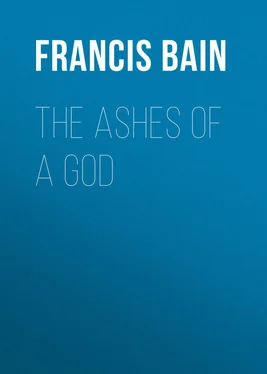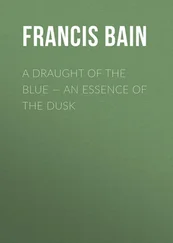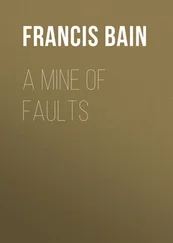Francis Bain - The Ashes of a God
Здесь есть возможность читать онлайн «Francis Bain - The Ashes of a God» — ознакомительный отрывок электронной книги совершенно бесплатно, а после прочтения отрывка купить полную версию. В некоторых случаях можно слушать аудио, скачать через торрент в формате fb2 и присутствует краткое содержание. Жанр: foreign_antique, foreign_prose, на английском языке. Описание произведения, (предисловие) а так же отзывы посетителей доступны на портале библиотеки ЛибКат.
- Название:The Ashes of a God
- Автор:
- Жанр:
- Год:неизвестен
- ISBN:нет данных
- Рейтинг книги:5 / 5. Голосов: 1
-
Избранное:Добавить в избранное
- Отзывы:
-
Ваша оценка:
- 100
- 1
- 2
- 3
- 4
- 5
The Ashes of a God: краткое содержание, описание и аннотация
Предлагаем к чтению аннотацию, описание, краткое содержание или предисловие (зависит от того, что написал сам автор книги «The Ashes of a God»). Если вы не нашли необходимую информацию о книге — напишите в комментариях, мы постараемся отыскать её.
The Ashes of a God — читать онлайн ознакомительный отрывок
Ниже представлен текст книги, разбитый по страницам. Система сохранения места последней прочитанной страницы, позволяет с удобством читать онлайн бесплатно книгу «The Ashes of a God», без необходимости каждый раз заново искать на чём Вы остановились. Поставьте закладку, и сможете в любой момент перейти на страницу, на которой закончили чтение.
Интервал:
Закладка:
F. W. Bain
The Ashes of a God
PREFACE
That mischief-making deity, the god of Love, who delights in getting others into trouble, got himself, once upon a time, if we may trust the poets, into trouble of no ordinary kind. For seeing, as he thought, his opportunity, he attempted to inflame Maheshwara himself with passion for the virgin Daughter of the Snow, who was standing shyly just in front of him, like an incarnation of irresistible seduction, raised to the highest power by the contrast between her coarse bark garments and the perfect beauty of the figure they enclosed. And then it was that the biter was bit, and Love himself was suddenly reduced to ashes for his impudence by a pulverising glance from the angry Maheshwara's terrible third eye, that opened for an instant, for unhappy Love's discomfiture, like the door of a blast-furnace upon a moth. And the pale young Moon looked out upon it all, from the hair of the angry god; the pale new Moon, that very Digit, who gives the title to our story, being therein described as so superlatively lovely, as to be capable of causing the very god of Love to rise from his own ashes.
For it is to be remembered that Love's ashes are no common ashes: they have in them something of the phoenix; they are always ready to revive. The beautiful lament of Rati (Love's wife), over the ashes of her husband (overheard by Kálidás), was really, had she only known, superfluous. He was sure to come to life again. Or, to speak plain English, a great passion is immortal: its very ashes are never absolutely dead. Breathe close upon them, and, as one of our own poets has said, it may be flame will leap. And this is the solid reason why the old Hindoo sages denoted both Love and Recollection by one and the same word. Memory, remembrance, regret, reminiscence; – all these are clearly closely akin, near relatives of Love. What is indifferent to us we soon forget; but we remember what we love, and the longer, in proportion as we love it more. And thus it comes about, that the most formidable obstacle to the would-be sage, the candidate for honours, as we might call him, in renunciation of the world, is his own recollection, his memory of the past. The object of the sage, according to the old Hindoo doctrine, is to become absolute master of himself ( jitátmá ), to render himself completely superior, or rather indifferent, to the "attachment" of all mundane clogs. The ordinary mortal is a prisoner, tied, bound in bondage, or attached ( sakta ), to and by the objects of delusion and sense. Whoever aims at emancipation must first, by a long and strenuous course of penance and austerity, sever these attachments, till even though he still remains among them, they run off him like water from a duck; and he goes on living, according to the classic formula, like a wheel that continues to revolve when the original impetus has ceased, or like a branch that goes on swaying after the departure of the bird. He is awake, as opposed to those who still remain blinded by illusion; he is free , as contrasted with the bound; his soul is unattached. But now, there is one thing, from which it may very well be doubted, whether even any sage, no matter what his elevation, was ever wholly free – regret. The strongest soul possesses the most powerful recollection, and unless madness intervene, to cut the thread by obliterating memory, there are things that refuse to be forgotten. And where recollection is, there is sure to be were it but a vestige of regret; for memory is love. And what, then, is it, that is of all things most peculiarly the object of regret; that laughs at all efforts to reduce it to oblivion and nonentity; that refuses to be driven into the oubliettes of any soul? Needless to say, a woman. And therefore it is, that she is regarded, in Oriental mysticism, as beyond all other things the enemy of emancipation; the clog par excellence ; the fetter of the soul; the everlastingly regretted, the unforgettable and unforgotten; the irreducible residuum; the inextinguishable spark among the ashes of the past. Was it not Swift, among whose papers, after his death, was found a packet, labelled in his own handwriting: Only a woman's hair ? And did not Coriolanus find in this the thing to thwart him, the obstacle that stood between his resolution and the overthrow of Rome? But we need not go to history or fiction to prove a thing endorsed by the experience of almost every man and woman since the beginning of the world. Everybody knows, what one has said, that youth is a blunder: manhood a struggle: old age a regret. Death is preceded by a sigh; did ever anybody die, who had absolutely nothing to regret? And regret, in the language of the old Hindoos, is nothing but the ashes of dead love, not utterly extinct; and therefore, since all love is more or less divine, the ashes of a god .
The ethical value of India's beautiful mythology is not sufficiently appreciated in Europe, whose people seem to think that virtue was discovered by themselves, and have learned from Xenophanes and Plato, S. Paul, S. Augustine, and other shallow politicians to deny all morality to polytheism,[ 1 1 The old argument: there is immorality in the stones of the gods; ergo , the men must be the same, is a monotheist calumny. Books like Kingsley's Roman and Teuton , where all the vice is imputed to the Roman, and all the virtue to the Teuton, are merely an inversion of the fact. "The truth is," says Professor Lewis Campbell on Æschylus, "that while religious custom lay upon the Greeks with a weight almost as deep as life, the changing clouds of mythology rested lightly on their minds, and were in their very nature, to some extent, the sport of fancy and imagination." This is equally true of the Hindoos.
] condemning the whole of antiquity for the vices of the old metropolis of Rome, which itself was no worse than many modern cities. And India is a survival from antiquity. But it is not, as some suppose, a sink of immorality; nor a barbarous tabula rasa , as others seem to think, with everything to learn in ethics, on which anything may be written that you please. The arrogance of ignorance is the cause of these misunderstandings. The Hindoos have a fable that the chakora , a legendary partridge, subsists on the beams of the moon: and the bird is no bad emblem of themselves. In the ruin of all their ancient glories, the one thing that remains to them is the thesaurus of religion and mythology preserved, like palæozoic flies in amber, in the crystal of their ancient tongue, whose presiding genius is the moon. For with them it is not as with us. Here, in the young nations of the West, literature and religion are not one thing, but two, with essences and origins altogether different and distinct, though now and then, a Milton or a Dante may, by welding them together, produce something more analogous to Indian poetry. For in India religion and literature are inseparable: they look back not to Greece on the one hand and Judæa on the other, but to a sacred compound of the two, all the nearer because it is their very own, whereas to us both Greece and Judæa are foreign, not only the places but the tongues, and likely in the immediate future to become still stranger than they are. This is why nobody can possibly understand anything of India who is ignorant of Sanskrit, which is the key to India, and from which all the modern local idioms, be they Aryan or not, borrow almost everything literary, religious, or philosophical that they contain.[ 2 2 The dictum of Mr. Rudyard Kipling, whose India is merely a misrepresented Anglo-India, that there ain't no Ten Commandments there, is superficially a truism, and essentially a foolish libel. No man has done more to caricature and misinterpret India, in the interests of military vulgarity, than this popular writer, to whom Hindoo India is a book with seven seals.
Интервал:
Закладка:
Похожие книги на «The Ashes of a God»
Представляем Вашему вниманию похожие книги на «The Ashes of a God» списком для выбора. Мы отобрали схожую по названию и смыслу литературу в надежде предоставить читателям больше вариантов отыскать новые, интересные, ещё непрочитанные произведения.
Обсуждение, отзывы о книге «The Ashes of a God» и просто собственные мнения читателей. Оставьте ваши комментарии, напишите, что Вы думаете о произведении, его смысле или главных героях. Укажите что конкретно понравилось, а что нет, и почему Вы так считаете.












